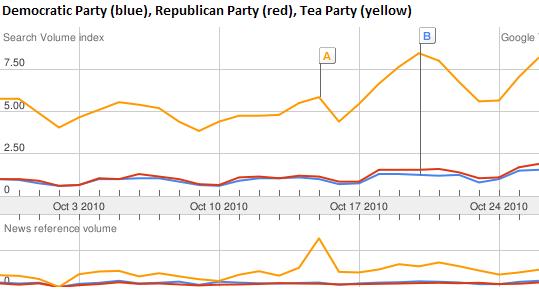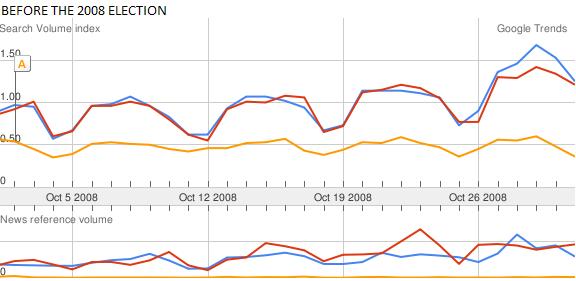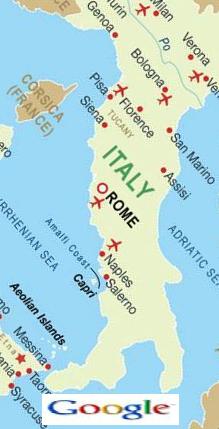The Future of SEO: Not Provided
Sep 30, 2013 Industry News, Optimization, Search Analytics, Web Analytics
So, let’s see if I have mapped out this ecosystem correctly.
1. People come to Google.com to do searches, because they perceive that Google’s search results are the best.
2. SEM marketers bid on impressions of certain words and phrases relating to their product, and the winners’ ads show up at the top of the page before the natural (unpaid) results. Some more paid ads appear on the right-hand side of the page.
3. Part of each paid ad’s success in the auction for impressions has to do with how well the content on the landing page for the ad’s link corresponds to the terms the person was searching for.
4. The unbiased “natural” search results appearing after the paid ads also have a kind of competition going on behind them. A search algorithm has to decide which order to present them in, and does so based on a large number of factors.
5. Firms in the SEO space have built a business out of using an understanding of natural search result ranking algorithms to help redesign sites to be as discoverable as possible through natural search.
SEO is based, in large measure, on data about who arrives on which pages after searching for various terms – this group could be analyzed, segmented and treated differently based on what they expressed an interest in via search. Remove the information about which terms an individual is searching for, and you are now stuck analyzing natural traffic as a giant undifferentiated blob of traffic.
Google just rendered this data invisible for natural search clicks. Who does that benefit?
1. Google likes SEM, because that is where their paychecks come from.
2. SEM and SEO are interrelated. If your site is employing good SEO practices, your SEM is more efficient. That means you make more money and probably allocate more over time to SEM. This is good for Google, but in an indirect way.
3. SEO is harder without granular keyword data that can be used to tailor site content to user needs (or advertiser goals). This is not good for SEO providers.
4. If sites in general begin to be less searchable as a result of Google’s cessation of critical SEO data, then users’ experience of search could possibly decline. I guess that depends on whether you believe the activities are, taken in the aggregate, improving search results or degrading them. SEO improves the search experience to the extent that it tries to discern the searcher’s intent and deliver what they are looking for. SEO degrades the search experience if it is trying to trick a user into visiting a page that is not what they are searching for.
– Apparently Google either believes:
a. SEO hurts the experience more than it improves it, or
b. Some degradation in the user experience is OK in the service of making more money while being able to claim a privacy/security benefit.
In any case, the deed is done.
Perhaps the folks at Google is looking to take the business of SEO for themselves? I mean no one knows the rules better than the people who make up the rules, right?
Tags: encrypted search, Google
Google Trends and the 2010 Elections – Can You Use Search Data to Predict Elections?
Nov 4, 2010 Industry News, Search Analytics
I am interested in the use of search data to predict and forecast real-world events. One example I have mentioned here before is the Google Flu Project, which uses the volume of searches for flu-related topics to actually do early detection and tracking of flu outbreaks.
I thought it might be interesting to see whether or not there was anything I could tell about likely election outcomes from the volume of searches related to the Republican and Democratic parties. I did a comparison of the search volumes for “Republican Party”, “Democratic Party”, and “Tea Party” during October 2010, and looked at the same data for October 2008 (leading up to the last presidential election). Interestingly. the major party with the lead in October searches came out the winner in both cases. The Tea Party search volume needs to be explained though – if the voting followed the search volume completely, then we’d all be speaking Tea Party-ese now.
October 2010: More searches for “Republican Party” (the red line) than for “Democratic Party” (the blue line)
October 2008: More searches for “Democratic Party” (the blue line) than for “Republican Party” (the red line)
I KNOW, ELECTIONS ARE ACTUALLY MORE COMPLICATED THAN THAT
One glaring weakness of my half-hour exploration into election forecasting is that it is hard to imagine prospective voters searching mainly using party names. It is far more likely that candidates’ names and words relating to major issues would be the search terms of interest for predicting election outcomes. That, however, is more work than I would do for a blog post. I encourage anyone reading this to take up the gauntlet and pursue the more detailed view. Let me know how that comes out!
WHAT ABOUT THE YELLOW LINE?
Another factor that would have to be dealt with in building a real live election forecasting tool using search data would be the curiosity factor. People don’t just use search engines to research their voting interests – they also use them to satisfy their curiosity about topics (and political parties) that are currently in the public eye. That complicates the forecasting problem a bit. How can you tell idle curiosity from actual voting interest? I will have to mull that over…
Tags: Election Forecasts, elections, Google, Google Trends, politics, search, search data and elections
Google Loses Italian Privacy Case
Feb 24, 2010 Industry News
For most of us, the recent Amanda Knox murder case was our introduction to the Italian justice system. Well, according to today’s New York Times article, several Google executives have gotten acquainted with some further nuances. For example, if you host user-generated content, you can be convicted of violating someone’s privacy if an upload to your site violates it – even if you cooperate with Italian authorities in the removal of the objectionable content and identification of the culprits.
This is a serious threat to the open sharing of information that has driven the web’s rapid adoption and growth. To force sites like YouTube to do prior filtering and checking would impose a huge burden on such sites, and could alter the viability of their business model. Worse, though, legislation purporting to protect the citizens of Italy could instead result in robbing them of free access to the web and all its unpredictable and messy usefulness. If the world ends up divided between net-freedom-haves and net-freedom-have-nots, Italy could end up on the same side of that line as China. That is not the side I’d choose to live on, no matter how good the wine and cheese are.
Tags: Google, Internet, Italy, Lawsuit, Privacy, User-generated content, YouTube



